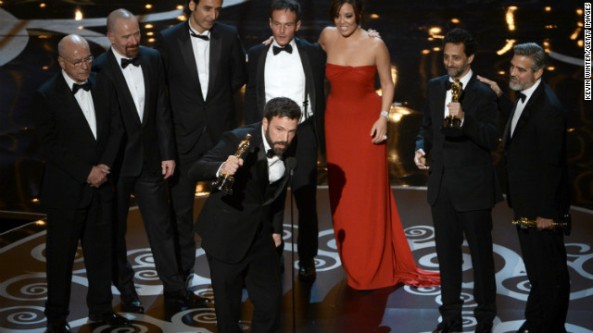I just finished watching a Katie Couric special edition of “20/20” in which they talked about everything that makes the Oscars iconic, but none of the reasons why I actually care about the awards. Hearing about Bjork’s swan dress is cute, but I’m in this for the movies.
Every year I come up with elaborate reasons why this year’s winner will mean something. For “The Artist” it was that even a silent, foreign, black and white comedy could win Best Picture and make people interested in a great form of movie history for just a little while. For “The King’s Speech” it was that the love for Old Hollywood was alive and well, even if I was pulling for the generational landmark that would’ve been a victory for “The Social Network.” And for “The Hurt Locker,” it signified a turning point in our view of the campaign in the Middle East, as well as a long denied achievement for women everywhere, which really is something to cheer about.
And yet just as I study every nominee and understand every nuance of the race, all of that is forgotten as quickly as the next year, and the only things that are left are the great movies themselves.
I think this year’s Oscars matter because above all, they will honor a lot of great movies, more than in most years. I may not think “Argo” is the best movie of the year, nor is my pick even nominated, but I think that whatever wins, it will be a victory for quality (except for “Les Miz” obviously).
Here then are my final predictions for what will take home gold on Oscar night. This year has been so exciting, so tumultuous, so long and so controversial that if I have to make one correct prediction, it’s that I will be wrong… possibly a lot.

Best Picture
- Argo
- Lincoln
- Silver Linings Playbook
- Life of Pi
- Django Unchained
- Zero Dark Thirty
- Amour
- Les Miserables
- Beasts of the Southern Wild
I don’t think I ever wanted to admit that there was going to be a sure fire winner for Best Picture, and I don’t think I ever could. The “Argo” freight train of success is still relatively fresh news. A lot has happened since it premiered at Telluride back in September, and there was a time just six weeks ago when nominations were announced that it looked to be a dead and gone afterthought. Now it has swept every major guild prize and award in sight, and it is poised to make history no matter what happens. All the comparisons that have been made to explain its victory in the context of past winners will be erased because its victory (or loss) will be completely unprecedented. Pundits will now point to it as the example.
If it wins, it will be because it is a great film, but also because it is an agreeable film that was able to weather the storm of controversy and barrier to entry better than any other.
“Lincoln” hardly seems formidable, and in fact “Life of Pi” or “Silver Linings Playbook” look even stronger with more recent wins in the bag, but it remains an even greater film in my view and is still, on paper, the predictable Oscar winner.
Brian’s Pick: Argo
Dark Horse: Lincoln, followed by Silver Linings Playbook, then Life of Pi
Should Win: Life of Pi Continue reading “2013 Oscars: Final Predictions”

